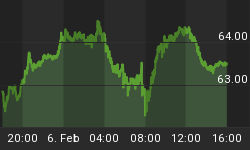It's the beginning of winter in Argentina and the only thing that's hot right now is the capital outflows. To give some idea of how hot, outflows increased by 150% in Q1 to $5.7 billion. If the $6 billion estimate for the second quarter proves correct, that would mean a total of $43 billion has left the financial system since Q3 2007. Individuals and corporations alone accounted for $3.6 billion of net outflow in the first quarter (see Chart 5). At present, the only thing catching on more quickly is Twitter.
Chart 1
So what is causing Argentineans to stash their money away in foreign banks and mattresses? President Cristina Fernandez. Since taking office in 2007, the president has been plagued by a messy debt situation left over from the default in 2002 and a slew of heterodox policies implemented by her husband when he was president - not her fault.
However, it's the manner in which she has been handling these challenges that has caused the capital flight. To name a few - drastically increased taxation on soy farmers has stoked a farming crisis since 2007, the nationalization of private pension assets in 2008, and a constant stream of dubious inflation statistics to keep the country's inflation-indexed bond payments artificially low. These are not exactly confidence boosters, and if there's anything we have learned over the past year it is that a basis of confidence, trust, and predictability in policymaking is the foundation of stable markets. Just ask Tim Geithner.
While these heavy outflows have troubling implications for consumer spending and domestic investment (and thus will exacerbate the current downturn), the real threat is to central bank reserves and the feed-through effects on the currency. Capital inflows normally cover shortfalls on the current account ledger, and the threat stems from the possibility that the central bank may be forced to liquidate some reserves for payment purposes should the outflows continue to accelerate. Reserves are currently stagnating as the central bank fans peso demand by selling dollars and could decrease significantly should a deficit need covering, thus reserve backing would wane for the Argentine peso and a sharp depreciation could be witnessed.
Chart 2
Understandably, investors are scared. How will the government cover its interest payments while adding to the mountain of debt this year as it records its first fiscal deficit since 2002? Will it nationalize more assets? Will it slap on capital controls to halt the exodus? Will it...(gulp)... default?
What the government needs to do is engineer a swift and transparent structural reform of the public finances. Cut spending, raise taxes a tiny bit, throw out stimulus packages, etc. because the economic pain that the country could potentially face should profligate spending continue will be far worse than tightening the belt right now. Restoring government finances to a sustainable trajectory, using legal and transparent measures, will greatly boost confidence and likely solve the capital flight problem. The question is however, whether the government has the will to do this.
Going forward, expect a tumultuous few months as the government grapples with inevitability. Buenos Aires can either change its ways or deal with the consequences. Whatever the path chosen, it shall certainly be a long winter for Mrs. Fernandez and her legislature.















